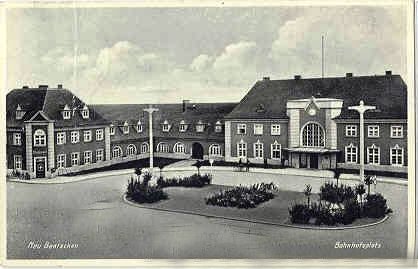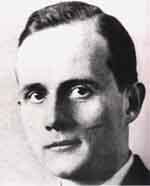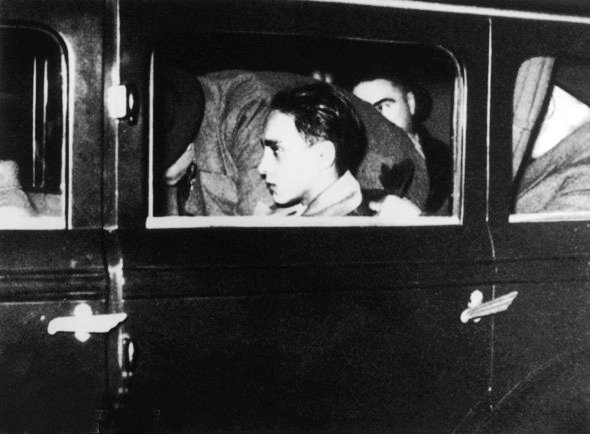Holocaust Education & Archive Research Team |
|
Holocaust Prelude Early Nazi Leaders Nazi Propaganda Nazi Racial Laws Sinti & Roma Kristallnacht The SS SS Leadership Wannsee
Prelude Articles Image Galleries | |||
Herschel Grynszpan
Herschel Grynszpan was born on the 28 March 1921 in Hannover, Germany, to Zindel and Rivka Grynszpan. He was one of three children an elder sister named Esther and a brother Mordechai.
Zindel a tailor prospered and Herschel grew up an intelligent sensitive child, with few close friends and was an active member of the Bar-Kochba Jewish youth sports club in the city. He studied at a Yeshiva in Frankfurt-am-Main, but he returned to Hannover where he applied to emigrate to Palestine, but this was rejected due to his youth.
Herschel Grynszpan went to live with his uncle and aunt Abraham and Chawa Grynszpan in Paris in September 1936 via another uncle Wolf who was living in Belgium. He entered France illegally as he would not have been granted entry to France, as he had neither work, nor financial support.
He settled in Paris living in a small Yiddish speaking group of Polish Orthodox Jews. He spent the next two years in vain trying to stay in France legally but this was unsuccessful. His re-entry permit for Germany expired in April 1937 and his Polish passport expired nine months later leaving Herschel without any legal basis for staying in France.
During the same period under the Nazis Zindel Grynszpan’s business declined and the Nazis made life increasingly difficult for Jews living there, with ever increasing restrictive regulations.
The Grynszpan’s were among the estimated 12,000 Polish Jews arrested, by the Nazis, deprived of their property and herded abroad trains destined for the Polish border.
When they reached the border, they were forced to walk several kilometres to the Polish border town of Zbaszyn, called Neubentschen in German. Zindel sent Herschel a postcard from Zbaszyn telling Herschel what had happened and asking for him to rescue them, the postcard reached Herschel in Paris on the 3 November 1938.
On the morning of the 7 November 1938 Herschel Grynszpan wrote a farewell postcard to his parents, which he never posted, bought a revolver and ammunition from a shop in Rue du Faubourg St Martin and caught a metro train to the Solferino metro station.
From there he went to the German Embassy at 78 Rue de Lille and asked, as a German citizen, to see an Embassy official. Herschel Grynszpan was shown into the office of junior official Ernst vom Rath. Grynszpan shot vom Rath several times, as an act of protest in the name of 12,000 persecuted Jews. He was arrested immediately by the French police.
Despite the best medical care vom Rath died on the 9 November 1938, he was given a state funeral in Dusseldorf attended by Adolf Hitler and Foreign Minister Joachim von Ribbentrop.
The death of Ernst vom Rath was the catalyst for the Nazis to launch the Kristallnacht and on the night of 9 November 1938 the Storm Troopers took to the streets crying for vengeance.
The Brown-shirts invaded synagogues and Jewish shops and homes to break, burn and loot, in their wake leaving shards of glass and shattered windows. Nearly 100 Jews died in the night of violence and some 30,000 Jews were arrested and interned in concentration camps, many to die from the savage brutality within the camps. Grynszpan’s family who were in Poland were not affected by the murderous pogrom.
From November 1938 to June 1940 Herschel was imprisoned by the French in Fresnes Prison near Paris, before being moved to the prison in Toulouse. One month after the German occupation on the 18 July 1940 Grynszpan was transferred from the Toulouse Prison to the border of the un-occupied zone where he was taken back to Paris by SS-Sturmbannfuhrer Karl Boemelburg, who was tasked with bringing Grynszpan into captivity.
From Paris he was flown to Berlin and locked up in the Gestapo headquarters at Prinz Albrechtstrasse. He was held in German custody in a number of Gestapo institutions, including Moabit Prison in Berlin, and Flossenburg and Sachsenhausen concentration camps.
The Nazis planned a great show trial orchestrated by Joseph Goebbels, hoping to demonstrate Grynszpan’s link with a Jewish conspiracy to plunge Europe into a war. Grynszpan himself seems to have sabotaged this scheme by reviving a story that had been fabricated about a homosexual liaison between the junior diplomat and himself.
During his time in Gestapo captivity in Berlin Grynszpan was brought before Adolf Eichmann who testified in his trial to meeting Herschel in either 1943 or 1944, and he recalled the meeting:
“I merely said then to Krischak that if he had completed the interrogation, I wanted him to bring him to me upstairs, for I very much wanted – for once – to look at the man Grynszpan. I wanted to talk to him.
And I did then exchange a few words with Grynszpan. He was very brief and brusque, was indifferent and gave short replies to all the questions. I wanted to ask him, since I had no knowledge at all of the whole matter, where he had been and things of that kind.
On the whole he looked well, he was small – he was a smallish lad…. this is still preserved in my memory, and then he was again returned to custody in Prinz Albrechtstrasse 8.”
His manner of death has never been ascertained but he was in all probability murdered by the Gestapo in Magdeburg Prison, he had been transferred there from Berlin.
On June 1, 1960, the Amtsgericht (Lower Court) of Hanover declared Herschel Grynszpan deceased. The date of death was fixed as May 8, 1945. It became official on July 24, 1960.
The Encyclopaedia of the Holocaust
Copyright: James Ardolin & Chris Webb H.E.A.R.T 2008 |





